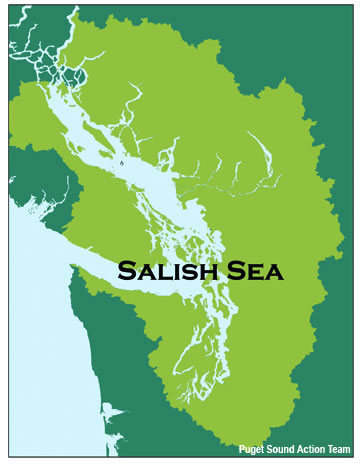My work with the Salish Center was focused on establishing a PDO (protected designation of origin) for all seafood harvested in the Salish Sea. In effect, this would ensure that all seafood derived from the Salish Sea would be labelled as such, and that no non-Salish Sea seafood could be labelled as a product of the Salish Sea. The concepts that we focused on reminded me of Wendell Berry’s work on The Pleasures of Eating and Karen Litfin’s work on Localism. In this way, my work with the Salish Center highlighted the intersection between the legal classification of food and how this fosters community development and pride in local food production.

Sample medallion for Salish Sea Certified PDO. Image courtesy of: https://salishcenter.org/#mission
As our program director told us, one of the primary goals of establishing a PDO for Salish seafood was to foster community pride in what he considers to be a superior food product relative to other seafood. By identifying a superior product as Salish Sea derived, the Salish Center hoped that local populations would be driven to protect the sanctity of the product’s origin. This is reminiscent of Berry’s quote that “eaters… must understand that eating takes place inescapably in the world” in order to contextualize their place in a larger food system. By stressing the importance of the health of the Salish Sea in bringing about its superior seafood, the Salish Center was essentially working to help consumers remember that their seafood and the quality thereof was contingent on a tangible, mutable part of the world.

The Salish Center’s work helped remind consumers of the tangible source of their product’s origin. Image courtesy of Puget Sound Action Team.
Further, by identifying superior Salish seafood as a local product, the Salish Center worked to incentivize consumers to reduce their “food miles” by buying local. The rationale behind this is that consumers would recognize and respond to the superiority of the Salish Sea’s products with increased consumption thereof, thus simultaneously supporting their own appetite and local food economies. As Litfin points out in “Localism”, “a local economy will have lower energy requirements and therefore be ecologically friendlier”. In this way, the Salish Center’s work contributed to environmental conservation.
My takeaway from this project is the power that something so simple as food labelling has in forming and protecting a community. Prior to working with the Salish Center, I could only imagine the corporate incentives behind labelling food as “organic” or “Walla-Walla sourced”, for example, but now I understand the importance that such labels have to protecting the source of the product and reinforcing pride in local food economies.

venusbet
kubet club 888 With a wide range of exciting games and a user-friendly interface, LunubetCasino offers endless entertainment and thrilling opportunities to win big!
Hey there! Looking for the latest updates in the world of cricket? Check out the hottest news and stay informed about match results and player performances with 24k bet Dont miss out on any of the action
Note that it is Immediate AI Urex quickly attracted the attention of cryptocurrency experts and investors and is the subject of much debate in the market. immediate urex review
I really happy found this website eventually. Really informative and inoperative, Thanks for the post and effort! Please keep sharing more such blog.
Also feel free to visit may web page. Truck Repair done right is a lifesaver for any fleet! Reliable and efficient solutions are crucial to keep trucks on the road and businesses running smoothly.
Unbelievable article! If you’re interested in making real money, this is a must-read. It provides unique insights and practical tips to help you succeed financially. Don’t miss out on this valuable information! join and experience now ekbet
Brilliant blog content. https://phcasinoauthority.com/
virtual experiences. MEGA888 ฝาก-ถอน ไม่มีขั้นต่ำ
I learn a few factor greater hard on various blogs normal. สล็อตวอลเลท
Hi! This is my first visit to your blog! We are a team of volunteers new JILI WALLET
Please keep up your good work. เว็บหวยออนไลน์ จ่ายจริง
Keep rocking. เว็บสล็อตออโต้
Switzerland, สล็อตออนไลน์
By identifying resolving inefficiencies, แลนด์ สล็อตออโต้
their social media strategies. เว็บสล็อต xo ออ โต้